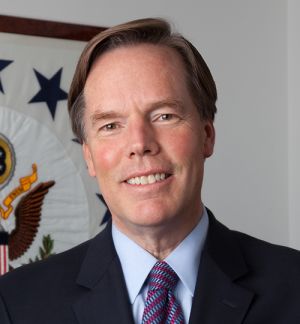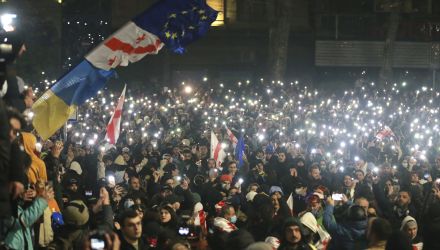As the holidays approach, 2012 hasn't provided much hope for the seasonal wish of "Peace on Earth." Not when the headlines reveal the savagery of the Syrian and Congolese civil wars, Hamas-Israel rocket barrages, insurrection in Mali, fighting in Afghanistan, violence in Egypt, and the heartbreaking nightmare of the death of innocent young children in Newtown, Conn.
Precious few world leaders seem to be using their power boldly and courageously for peace. Instead, we see the Arab world in revolution without an Anwar Sadat to guide it, Congo without the moral leadership of a Desmond Tutu or Nelson Mandela, Israel without a Yitzhak Rabin who had the courage to talk to the enemy.
But, if we look at this year more closely, it is possible to find people, thousands of them, who may not have the power of a state at their disposal but are pushing the cause of peace step by difficult step in every corner of the world. I asked my Harvard Kennedy School students to help me find champions of peace. Here are some whose dedication to peace at the village, national, and global level should inspire us.
Lakhdar Brahimi. The wily, veteran Algerian diplomat who has the toughest job in the world -- UN envoy for the Syrian civil war -- refuses to quit in his determination to end the fighting that has killed over 40,000 civilians. As he did in both Afghanistan and Iraq, Brahimi is not afraid to challenge the United States, Russia, and other great powers to find a way to work together. With the dictator Assad on the ropes, will Brahimi help to secure a desperately needed peace for Syrians in 2013?
Aung San Suu Kyi. Perhaps the singular moral leader of our time, this quiet, unassuming woman, who survived over a decade in house arrest, has skillfully maneuvered her country's generals to begin dismantling Burma's dictatorship. When she spoke at Harvard this autumn, her dignity and grace inspired the thought that the cause of human freedom endures even in the most difficult circumstances.
Tim Shriver. Continuing in the tradition of his remarkable parents, he is spreading the magic of the Special Olympics to more than 4 million young people with intellectual disabilities in nearly every country of the world. From an extended family that personifies public service, he is building peace in the hearts of kids and adults alike one at a time.
The European Union. It is fashionable to criticize this year's Nobel Peace Prize recipient at a time of economic and political crisis. But, along with the rise of China, the emergence of the EU from the ashes of the Second World War is one of the most important events of our time. After a century of war that killed millions, Europe has now mercifully found a democratic peace thanks to the EU and its cousin, the NATO alliance.
Maria Santos Gorrostieta and Malala Yousafzai. Gorrostieta, the reformist mayor of the small Mexican city of Tiquicheo, was killed by the narcotics cartels that rule much of her country. Yousafzai is the Pakistani teenager who barely survived an attack by the Taliban for championing education for young girls. These two courageous leaders exemplify the leading role of women in trying to secure their communities against criminals and terrorists.
New York Mayor Michael Bloomberg, Senator Dianne Feinsteinof California, and Representative Carolyn McCarthy of New York. In the wake of the horrific shootings of 6- and 7-year-olds in Newtown, they were the first political leaders to stand up to the National Rifle Association in calling for a ban on assault weapons. Will President Obama and members of Congress rally to their moral leadership?
There are peacemakers all around us as we struggle to create a 21st-century world more democratic, civil, and just. But, the 9/11 decade and traumatic events like Newtown make it difficult sometimes to believe peace will ever be possible in our age of violence and insecurity. How else to explain why Democratic and Republican leaders rarely cite the goal of peace as among our highest ambitions as Lincoln, FDR, and Martin Luther King once did? Security, of course, is vital to our democratic society and hopes for the future. But so is the ancient, elusive dream of a more peaceful world. That, at least, is what courageous peacemakers seem to be telling us in this season of peace.
Nicholas Burns is a professor of the practice of diplomacy and international politics at Harvard's Kennedy School of Government. His column appears regularly in the Globe.
Burns, Nicholas. “Peacemakers 2012.” The Boston Globe, December 20, 2012





